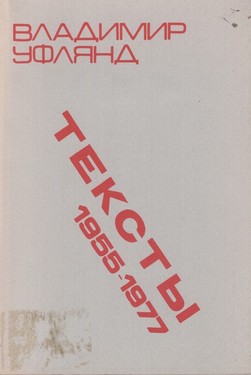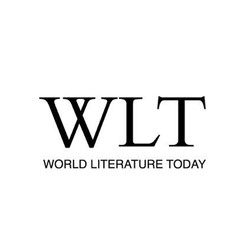Still in his early forties, Vladimir Ufliand has had a checkered career as a student of history, a graphic artist, author of children's books and a playwright; he also worked for a time as a stoker, served in the army and spent time in prison. Only occasionally has he turned his hand to poetry: this small volume comprises almost all of his poems. Only a few of them have been published heretofore, both in the Soviet Union and abroad.
One of the astonishing things about modern Russian poetry is the very large number of poets who, while not of the first rank, are really very good indeed – in terms of high seriousness, technical accomplishment, the richness of their cultural material or just plain wit. Ufliand does not fit into even this category, but he is interesting in some respects nevertheless. His theme is the pathos of the free spirit in modern society, the poor artist in a materialistic world, the sensitive soul among the philistines. There is a good deal of technical novelty; sometimes it works and sometimes it does not. Where it does succeed, the poet does not seem able to sustain it for long: too often the experiment falls flat, or even into bad taste. In general, though, there is evidence enough at least of promise for the future.
Все еще сорока с небольшим лет, Владимир Уфлянд успел сделать пеструю карьеру в качестве студента-историка, художника-графика, автора детских книг и драматурга; он также работал какое-то время кочегаром, служил в армии и сидел в тюрьме. Только иногда он обращался к поэзии: эта маленькая книжка содержится почти все его стихи. Лишь несколько из них были опубликованы раньше, как в Советском Союзе, так и за рубежом.
Одна из удивительных особенностей современной русской поэзии – это большое количество не первоклассных, но действительно очень хороших поэтов – с точки зрения их высокой серьезности, технического совершенства, богатства культурного материала или просто остроумия. Уфлянд не вписывается даже в эту категорию, но тем не менее он кое в чем интересен. Его главная тема – пафос свободного духа в современном обществе, бедный художник в материалистическом мире, чувствительная душа среди обывателей. Здесь очень много технической новизны; иногда это работает, а иногда нет. Там, где это удается, поэт, по-видимому, не в состоянии держать планку долго: слишком часто эксперимент проваливается или даже превращается в дурновкусие. В целом, однако, есть достаточно доказательств, хотя бы обещающих поэту будущее.



